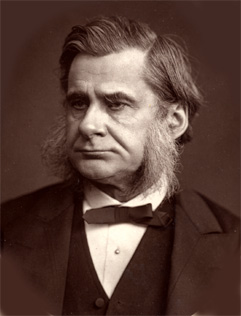“A grande tragédia da ciência: o massacre de uma bela hipótese por parte de um horrível facto.”
Variante: A grande tragédia da ciência: o massacre de uma bela hipótese por parte de um horrível fato.
Thomas Henry Huxley foi um biólogo britânico que ficou conhecido como "O Buldogue de Darwin", por ser o principal defensor público da teoria da evolução de Charles Darwin e um dos principais cientistas ingleses do século XIX. Wikipedia

“A grande tragédia da ciência: o massacre de uma bela hipótese por parte de um horrível facto.”
Variante: A grande tragédia da ciência: o massacre de uma bela hipótese por parte de um horrível fato.
“A verdade é a essência da moralidade.”
Veracity is the heart of morality
Science and education - página 178, de Thomas Henry Huxley, editora P.F. Collier, 1893, 381 páginas
“A ciência se suicida quando adota um credo.”
science [...] commits suicide when it adopts a creed
Darwiniana: Essays by Thomas H. Huxley - Página 252, Thomas Henry Huxley - D. Appleton and company, 1896 - 475 páginas
Variante: A ciência comete suicídio quando adopta um credo.
Thomas Henry Huxley, conforme relatado por Singh, Simon - Big Bang - Editora Record - Rio de Janeiro / São Paulo - 2006. ISBN: 85-01-07213-3 (pág. 459)
Atribuídas
“Prefiro ser parente de um macaco que de um homem que usa eloqüência para destruir a verdade.”
Fonte: Revista Superinteressante Nº 004 http://super.abril.com.br/superarquivo/1988/conteudo_111022.shtml
“Toda verdade inédita começa como heresia e acaba como superstição.”
the customary fate of new truths to begin as heresies and to end as superstitions
Darwiniana: Essays by Thomas H. Huxley - Página 229, Thomas Henry Huxley - D. Appleton and company, 1896 - 475 páginas
“O destino das grandes verdades é este: começam como heresias e acabam como superstições.”
Variante: O destino normal das novas verdades é começar como heresias e terminar como superstições.
“A grande finalidade da vida não é o conhecimento, mas a ação.”
Variante: A grande finalidade da vida não é o conhecimento, mas a acção.
Variante: Qualquer pessoa que tenha experiência com o trabalho científico sabe que aqueles que se recusam a ir além dos factos raramente chegam aos factos em si.
the rung of a ladder was never meant to rest upon, but only to hold a man's foot long enough to enable him to put the other somewhat higher.
Critiques and addresses - página 57, de Thomas Henry Huxley, Editora D. Appleton and company, 1873, 317 páginas
“As piores dificuldades de um homem começam quando ele é capaz de fazer o que quer.”
A man's worst difficulties begin when he is able to do as he likes.
Science and education - página 203, de Thomas Henry Huxley, Editora P.F. Collier, 1893, 381 páginas
Trust a witness in all matters in which neither his self-interest, his passions, his prejudices, nor the love of the marvellous is strongly concerned. When they are involved, require corroborative evidence in exact proportion to the contravention of probability by the thing testified
Essays upon some controverted questions - Página 344, Thomas Henry Huxley - Macmillan, 1892 - 625 páginas
“Um mundo de fatos estende-se para além do mundo das palavras.”
Variante: Um mundo de factos estende-se para além do mundo das palavras.
Thomas Henry Huxley como citado em O Quebra Cabeça Da Criação - página 114 https://books.google.com.br/books?id=EzhRBQAAQBAJ&pg=PA114, Roberto Neves, Clube de Autores, 2009, 465 páginas
Atribuídas
1860s, On a Piece of Chalk (1868)
Fonte: 1860s, Evidence as to Man's Place in Nature (1863), Ch.2, p. 74
1890s
Sydney J. Harris, as quoted in The Routledge Dictionary of Quotations (1989) by Robert Andrews; also quoted as: "...a pleasant place in which to spend one's leisure."
Misattributed
Fonte: 1860s, Evidence as to Man's Place in Nature (1863), Ch.1, p. 36
Fonte: 1860s, Evidence as to Man's Place in Nature (1863), Ch.2, p. 127
“That mysterious independent variable of political calculation, Public Opinion.”
"Universities, Actual and Ideal" (1874) http://aleph0.clarku.edu/huxley/CE3/U-Ac-I.html
1870s
Fonte: 1860s, Evidence as to Man's Place in Nature (1863), Ch.2, p. 86
Fonte: 1860s, Evidence as to Man's Place in Nature (1863), Ch.2, p. 71
Fonte: 1860s, Evidence as to Man's Place in Nature (1863), Ch.2, p. 101
"On the Educational Value of the Natural History Sciences" (1854) p. 29 http://books.google.com/books?id=FJZWAAAAcAAJ&pg=PA29
1850s
Fonte: 1860s, Evidence as to Man's Place in Nature (1863), Ch.2, p. 126
Fonte: 1860s, Evidence as to Man's Place in Nature (1863), Ch.2, p. 72
"Our Knowledge of the Causes of the Phenomena of Organic Nature" (1863) http://aleph0.clarku.edu/huxley/CE2/Phen.html
1860s
1860s, Reply to Charles Kingsley (1860)
“Logical consequences are the scarecrows of fools and the beacons of wise men.”
1870s, On the Hypothesis that Animals are Automata, and Its History (1874)
Fonte: 1860s, Evidence as to Man's Place in Nature (1863), Ch.2, p. 119
Fonte: 1860s, Evidence as to Man's Place in Nature (1863), Ch.2, p. 125
"On the Physical Basis of Life" (1868) http://aleph0.clarku.edu/huxley/CE1/PhysB.html
1860s
Fonte: 1860s, Evidence as to Man's Place in Nature (1863), Ch.2, p. 95
1860s, On a Piece of Chalk (1868)
Advertisement to the Reader, p. 7
1860s, Evidence as to Man's Place in Nature (1863)
Another version of this quotation, omitting the "of me" phrase, appears in Life and Letters of Thomas Henry Huxley F.R.S (1900) edited by Leonard Huxley, p. 170
1880s, On the Reception of the Origin of Species (1887)
1860s, Criticisms on "The Origin of the Species" (1864)
Fonte: 1860s, Evidence as to Man's Place in Nature (1863), Ch.2, p. 120
"Technical Education" (1877) http://aleph0.clarku.edu/huxley/CE3/TechEd.html
1870s
1870s, On the Hypothesis that Animals are Automata, and Its History (1874)
Letter to Charles Kingsley (6 May 1863)
1860s
"The Coming of Age of The Origin of Species" (1880) http://aleph0.clarku.edu/huxley/CE2/CaOS.html; Collected Essays, vol. 2
1880s